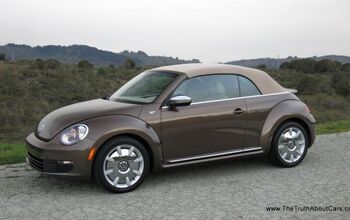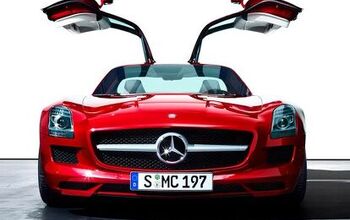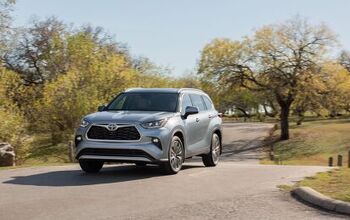German Car Sales Eruption

If this is a dead cat bounce, then it is a dead cat on steroids: German new car registrations jumped an unbelievable 40 percent in March. This according to data released by the Verband der Internationalen Kraftfahrzeughersteller (VDIK). Taking the Easter holidays in to account, which were in March in 2008, the gain still is a very impressive 20 percent, Automobilwoche [sub] writes. In the same month, sales in the USA continued to crater. The German sales blitzkrieg comes on the heels of a 22 percent jump in February.
The main reason for the incredible increase is the cash-4-clunkers Abwrackprämie. Buyers of a new car receive €2.5K if they retire their old one. Sellers of small cars profited most. French and Italian cars dominate this segment. In Germany, volume manufacturers Volkswagen, Ford, and even Opel profited. Even makers of luxury wheels see some improvement: Porsche reports an increase of 15 percent. Even BMW sees “first signs of an improvement.”

Bertel Schmitt comes back to journalism after taking a 35 year break in advertising and marketing. He ran and owned advertising agencies in Duesseldorf, Germany, and New York City. Volkswagen A.G. was Bertel's most important corporate account. Schmitt's advertising and marketing career touched many corners of the industry with a special focus on automotive products and services. Since 2004, he lives in Japan and China with his wife <a href="http://www.tomokoandbertel.com"> Tomoko </a>. Bertel Schmitt is a founding board member of the <a href="http://www.offshoresuperseries.com"> Offshore Super Series </a>, an American offshore powerboat racing organization. He is co-owner of the racing team Typhoon.
More by Bertel Schmitt

































Comments
Join the conversation
The cat pictured above was alive when the picture was taken.
Perhaps those billions that were lent to GM and Chrysler and the billions more to come should have been used for a similar program in the U.S. instead. That would have been helping those who actually buy cars though. Can’t do that! that infact is not a bad idea. Kind of force GM to pull up their socks. As it is now GM may still dont give a F ing damn if the car will die after 50 ft away from the stealership. And is their Who gives a F attitude that got themselves into the eyeball full of alligators.
@snabster: Car financing & leasing: Car financing isn't such a problem in Germany. At least, if you have a job or a regular income. For self-employed people it may be a hassle, although. Banks hate freelancers. Banks also hate old people. So, freelancers over 60 need not apply. That's why I hate banks. But provided you meet their basic requirements, you have the same options as in the US. - There are a lot of dealer offers, not only at local level (even Mercedes, Audi and BMW are offering something) - There are consumer credits in a range between 5.95 to 10.9 % (c.f. http://biallo.boerse-online.de/tz/boerse-online/Kredit/Kreditrechner.php?nv=Teasertext_BialloKredit) - There are leasing offers for private customers, as well, although I doubt that private leasing is a mass phenomenon in Germany. But Peugeot, for example, offers a so-called 0% leasing (I didn't read the fine print, however) . Provided you are flexible in your car selection, you can easily replace an old clunker with a new one. You are best off, when all you want is an A-to-B car w/o automatic transmission. Keeping used cars: Being poor (a.k.a. having low income) is a sad state. In such a situation, it's most probably the best to have no car at all. This would be feasible if you are living in an urban area in Europe. Don't expect to get rich without a car, however. The money you save on cars will easily be sucked off there by paying higher rents, for using public transport and generally higher costs of living. The Bavarian police, for example, has difficulties to get policemen to work in Munich because of the high costs of living there. So, normally we need a car, even if we are poor, because we need to go to work and do some shopping. With new cars, the cash4clunker program worked fine, as - together with dealer incentives - you had been able to buy an almost new car for less than 7,000 Euro (e.g, a Hyundai Getz (not sold in the US, I presume), which is a decent little car that is now replaced by the Hyundai i20). This is a price region that normally was not in reach when you were looking for a new car (aside from the slave-built Dacias). But the cost of buying a car (whether old or new) is just the best visible part in this game. You can start very cheap and this will be true for both the US and Europe. If you want to have a look at used car prices check http://www.mobile.de/home/index.html?lang=en). Depending on how poor you are, the running costs might be neck-breaking, as you not only have to pay car taxes, but also for insurance, gas, maintenance & repair. And here it is where we have differences between the US and Germany/Europe, most notably with gas prices. Due to taxation, the gas prices here in Europe (depending on the country you live in) are at least twice of that you normally pay in the US. This is probably the strongest incentive in Europe to drive small, fuel-efficient cars. But there are others: - Driving a big car simply sucks here, when you consider the layout of streets (often going back to the times of the Roman Empire), parking places (to less, to little), etc. Aside from the Autobahn, i.e., there were you can meet nice people, it often is a pain to drive anything bigger than, e.g., a Golf. - Car insurance also favors small, underpowered cars, although you will have to consider an extra premium for Diesel cars because such cars are more prone to theft. The difference in insurance costs between the entry-engine Golf and the GTI really is hefty. If we take the above points into account and also consider the fact that the US does not suffer from ancient, inherited Roman street and road designs, if we also take into consideration that on average the number of miles to travel from A to B is higher in the US than in Europe, we might find it perfectly reasonable that there is a preference for bigger, comfortable cars in the US. Aside from that, and regarding the low-income issue, there is an old Bavarian proverb: "Besser reich und gesund, als arm und krank." (Better be rich and healthy than poor and sick). You simply have more options with such a setup. You could even afford a brand-new Prius (for your wife), and/or a Tesla for yourself.